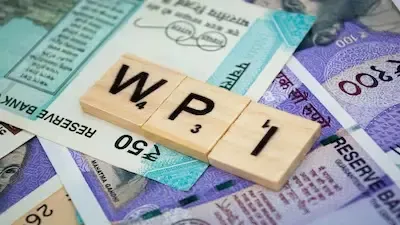Has India's WPI Inflation Dropped to 0.13 Percent in September?

Synopsis
Key Takeaways
- WPI inflation in India dropped to 0.13 percent in September.
- Food prices declined by (-)1.38 percent.
- Fuel inflation remained negative at -2.58 percent.
- CPI inflation fell to an eight-year low of 1.54 percent.
- RBI has revised its inflation forecast for 2025-26 down to 2.6 percent.
New Delhi, Oct 14 (NationPress) The annual inflation rate in India, as measured by the Wholesale Price Index (WPI), has decreased to 0.13 percent in September, down from 0.52 percent in August, according to data released by the Ministry of Commerce and Industry on Tuesday.
Food prices experienced a decline of (-)1.38 percent during the month, driven by improved crop yields and sufficient buffer stocks of wheat and rice. Additionally, fuel prices including petrol, diesel, and natural gas continued to see a downward trend, with fuel inflation remaining negative at -2.58 percent, as indicated by the figures.
The month-on-month change in WPI for September was recorded at (-)0.19 percent compared to August.
On a year-on-year basis, inflation in September remained positive, primarily due to rising prices in manufactured goods, non-food articles, other transport equipment, and textiles, as noted in the official statement.
In a related development, the consumer price index (CPI) inflation rate in the country has dropped to an over eight-year low of 1.54 percent in September, compared to the same month last year, attributed to lower food and fuel prices, as per data released by the Ministry of Statistics.
This rate marks the lowest year-on-year inflation since June 2017 and is also below the 2.05 percent inflation rate recorded in August.
Food inflation has remained negative for the fourth consecutive month, recorded at -2.28 percent in September, according to the figures.
The decrease in overall inflation and food inflation during September is largely due to a favorable base effect and reduced prices of vegetables, edible oils, fruits, pulses, cereals, and eggs. In addition, fuel prices also declined during the month, as stated in the official report.
The inflation forecast for 2025-26 has improved, thanks to favorable base effects, good southwest monsoon conditions, healthy kharif sowing, adequate reservoir levels, and sufficient buffer stocks of food grains. The GST rate cuts effective from September 22 are also expected to lower prices across various goods, potentially reducing inflation further in the upcoming months.
This reduction in the inflation rate provides the RBI with more flexibility to maintain a soft monetary policy through interest rate cuts and increased money supply to stimulate economic growth.
On October 1, the RBI's monetary policy committee (MPC) revised its inflation forecast for the financial year 2025-26 down to 2.6 percent from 3.1 percent in August, primarily due to the GST rate cuts and stable food prices.
RBI Governor Sanjay Malhotra mentioned, "The recent GST rate adjustments are set to lower prices on numerous items in the CPI basket. Overall, the inflation outlook is expected to be softer than earlier projections, mainly because of the GST rate cuts and stable food prices."










